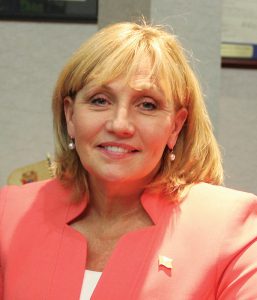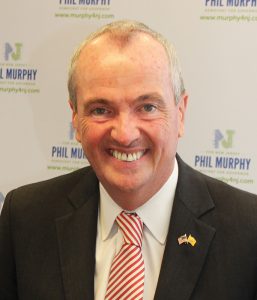On Tuesday, Nov. 7, New Jerseyans go to the polls to elect a new governor. In September, Ray Pinney, NJSBA’s director of member engagement, interviewed both of the major party candidates.
On these pages is a condensed version of their answers to questions on a range of educational issues. A video of the full interview is online at www.njsba.org/gov-candidates-2017.

Republican gubernatorial candidate Kim Guadagno is New Jersey’s first lieutenant governor. An attorney, former Monmouth County sheriff and former prosecutor, Guadagno has a long record of public service: she was an assistant U.S. attorney, an assistant New Jersey attorney general, and she taught at Rutgers law school. She lives in Monmouth County with her family.
Guadagno and her husband have three sons, and she approaches education from the perspective of both public policy and her own experiences. She recently shared her views on a variety of topics of interest to board members.
School funding is the single most important issue that concerns board of education members. What changes should be made to the way schools are funded in New Jersey? School funding is the single most important issue that concerns board of education members. What changes should be made to the way schools are funded in New Jersey? We need to review the business plan on how we fund education. That means recognizing “how well” education dollars are spent is as important as “how much” is spent. As governor, I will audit every school district to ensure that money is being spent to improve education. If it’s not, we should reinvest those efficiencies in education by hiring more teachers, for instance. We should also ensure that millionaires in Jersey City and Hoboken are paying their fair share for education, and seek to make the formula fairer for districts.
New Jersey has historically employed standardized tests to help monitor student progress. Would you advocate changes in standardized testing? As the mother of a high schooler who took PARCC, I think that teachers should be allowed to do what they love – teach – and not just teach to the test. There is much more to education than testing. As governor, I will examine the state’s testing requirements if elected and eliminate unnecessary testing.
What is the place of charter schools in public education, and how should they be funded and authorized? I believe we have a moral obligation to provide the very best education to our kids, so I am a big believer in school choice. We have to give parents options, especially in areas where traditional public schools may not meet the needs of all students. But school choice can take many forms. That includes charter schools, or even Interdistrict Choice. I believe we should look to reduce the wait list for charter schools.
Charters are laboratories of educational innovation – utilizing creative ways to meet the needs of students –including more time on task, testing of new teaching and staffing models, implementing rigorous blended approaches, and focusing on STEM and performing arts. We need to do more to help charter schools grow and serve more students – such as our most at-risk youth – including students with autism or development delays. We need to provide greater flexibility and autonomy – including greater flexibility in the teacher certification process. We need to ease facilities and funding hurdles – including exploring ways to make it easier for charter schools to find facilities.
We need to look no further than the Stanford University study to know that charters do work in some areas. The state must ensure that the original intent of the Legislature to establish fairness in the funding of charter schools by providing these schools with 90 percent of the per-pupil funding of the host district is faithfully put into practice.
The cost of providing special education services has grown faster than that for providing general education. How can the state help local school districts provide special education services more cost effectively? Every child regardless of his or her ability or life challenges deserves a high quality education. Meeting this moral obligation in the most cost-effective way possible is the challenge. First and foremost, we need to reevaluate school funding. The funding formula is the central factor impacting special education and service delivery in our state. I will also direct my commissioner of education to encourage school districts and charter schools to explore and establish partnerships with educational service commissions, special services school districts, approved private schools for students with disabilities, as well as other school districts, to expand the range of programs and services for students eligible for special education and related services in their local schools. I will also encourage school districts and charter schools to maximize the use of coordinated transportation services agencies for transportation, including routes across county lines, and ensure use of the minimum number of vehicles, with the first priority being the needs of the student, and where a cost benefit exists.
What is your vision for New Jersey’s public schools four years from now when you conclude your first term as governor? We will emphasize 21st century curriculum and skills aimed at what is good for children – whether in private/public (and vocational), and charters schools. We should require all high school students to take coding courses. We will focus on STEM, coding, stackable credentials, and providing every child the opportunity to succeed according to his/her potential. We will give students more options – not all kids have to go to college, but they all should have a living wage. We need to advance the pathways to do so – including vocational education, 2-year and 4-year schools.

Democratic gubernatorial candidate Phil Murphy is a retired Goldman Sachs executive and the former ambassador to Germany. He has been appointed to lead several state and national task forces, including one focused on 21st century public education, and served on boards of many civic or philanthropic groups. Murphy is married with four children, and like his opponent, he lives in Monmouth County. Murphy began a recent conversation with NJSBA by calling himself a “proud product of public education,” and noting his sister is a retired educator. Below he shared his views on timely education topics.
School funding is the single most important issue that concerns board of education members. What changes should be made to the way schools are funded in New Jersey? In more than 40 years of litigation, New Jersey has had one school funding formula which has been deemed constitutional by the New Jersey Supreme Court, in 2008. Since 2010, Governor Christie and Lieutenant Governor Guadagno have ignored that formula entirely, and, in the process, have underfunded public schools by nearly $9 billion, and roughly $900 million in the 2017-2018 school year alone.
The school funding formula hasn’t failed – what’s failed is leadership to properly fund our schools. No one knows that better than the local district leaders making budget decisions knowing they aren’t receiving the resources they were promised.
As a first principle, we must get to fully funding our existing school formula as it was designed, and making the adjustments necessary after eight years of it being ignored to ensure it meets today’s needs.
New Jersey’s finances have been mismanaged for the past eight years, with the 11 consecutive credit downgrades to prove it. Instead of solving our problems, the Christie-Guadagno administration has only made them worse through years of ignoring our obligations, underfunding vital programs, and diverting funding away from their legislated purposes to fill budget gaps elsewhere.
We are suffering from a tremendous lack of trust in our finances, from the credit rating agencies to everyday residents. I want to get that trust back.
My budgets will be based on realistic expectations, living up to our obligations, and ending the fiscal games and diversions that have broken the trust of residents.
What do you think is the place of charter schools in public education, and how should they be funded and approved? The Christie-Guadagno administration has taken a top-down approach to charter schools that has all but shut out the voices of school board members, educators, and communities. I pledge to change that.
I am concerned that, too often, charters fail to reflect the diversity of their communities and leave districts with disproportionate numbers of high-needs students. And, I am concerned that we hold charters to a separate and unequal set of standards of accountability than we do district schools.
There has yet to be a true conversation between all parties to develop a reasonable plan forward based on facts – what works, and what doesn’t. I support a “time out” on the charter application process to allow for that discussion.
Charter schools and regular district schools can co-exist where they are appropriate. They should not, however, be used as an excuse to weaken and divest of our high-performing district schools.
New Jersey has historically employed standardized tests to help monitor student progress. Would you advocate changes in standardized testing? Standardized tests have a role, but we need to remember their role. Good educators and good students can have bad test days. Too much emphasis is being put on a single test, as opposed to weighing a student’s progress through years of instruction.
I will eliminate PARCC, and remove exit testing requirements for our high school seniors – you know your students’ needs better than a test. The era of high-stakes, high-stress standardized tests in New Jersey must end, and I will see that it does. We must get back to letting districts use classroom time to teach to the needs of students, and not to a test.
The cost of providing special education services in districts has grown faster than that for providing general education services. How can the state help local school districts provide special education services that students need more cost effectively? The state can begin by fully funding the constitutional formula, and directly providing local districts the resources they not only need, but deserve, to meet the needs of all students.
Fast forward four years from now. What would you hope is different and better about New Jersey’s public schools at the end of your first term as governor? I hope to see fully funded public schools doing great things not only for the kids in the classroom, but in their communities. We cannot have a stronger, fairer, and more sustainable economy with good new jobs unless we have the public education system that must be at the core of creating tomorrow’s high-skilled workforce.
